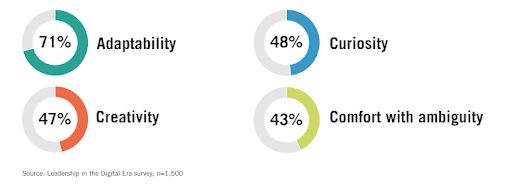
WHY SHOULD YOU CARE?
After two years of pandemic as a result of global changes, soft skills are more important than ever at work. As studies revealed, even in the Digital Age these skills matter most as key leadership skills ahead of technical IT skills.
The world is changing and so are organisations. Leaders are expected to lead business in finding the right answers for the new world of work. A number of changes have changed the socio-economic environment that companies operate in. At the time of this publication, a war is happening in Ukraine. These changes have created a new state of VUCA world which call for leaders to be able to find real solutions to real life problems that people and business face. So is the answer coding? No the answer is curiosity says Linda Hill, Anne Le Cam, Sunand Menon and Emily Tedards from Harvard Business School. 1
The US economy shrank by 3.4% in 2020 and grew by 5.7% in the year 2021 as it recovered from the shocks of the COVID 19 pandemic. Despite this growth, this was below the expected growth trends. These shocks in the economy and social changes seen in the USA and across the globe require a new set of leadership skills to deal with a new set of business problems.
A study by the Harvard Business School shockingly revealed that soft skills matter most as key leadership skills ahead of technical IT skills such as coding in managing the new changing world.1 This however does not mean that coding and IT skills are not important leadership skills for strategic business leaders. Coding skills remain relevant to all leaders as companies work towards digital transformation.
The survey by Harvard Business School revealed that curiosity, creativity, adaptability and comfort with ambiguity as the top highly desirable leadership traits of the new world of work. The survey by Harvard Business Review focused on 1500 executives from more than 90 countries. 71% of these 1500 executives also indicated that adaptability matters most at strategic level when it comes to be dealing with leading digital transformation. In the survey, Below is a survey report extract from the Harvard Business School which indicated that curiosity was a skill that was selected as a more important strategic leadership skill as compared to coding. 1

1. Coding is a technical skill which is rarely done by strategic leaders in large companies
If your company is as large as Oracle or Microsoft, ask your Chief Information Officer or Chief Technology officer about the day when they last picked up a piece of code and did the actual coding.2 They are likely to tell you that they rarely code except for a few moments when it is critical. Rather they supervise the work to check as to whether the solution is solving business problems.3 The role of the Chief Technology Officer is not to code software but to present solutions. He or she has a team of software developers, engineers and managers to do the technical work for him or her. This then makes decision making, curiosity, adaptability and other soft skills more relevant for the strategic leaders as compared to technical IT skills such as coding. It is only in smaller companies and start-ups where you often find CTOs doing the actual coding. They have people working under them who do coding but CTOs still need to have an appreciation of coding.
2. Strategic leaders need to continuously find new answers (explorer)
The study by the Harvard Business School reveals that leaders should be explorers who are the to continuously seek answers to existing and non-existing problems. “An explorer searches with an ambition in mind: What questions must they answer to lead their business today and tomorrow? Where might they find answers?” writes Linda Hill, Anne Le Cam, Sunand Menon and Emily Tedards from Harvard Business School. In the technology market, as companies such as Erickson, Huawei and Nokia are deploying 5G technology, their engineers are already working on a future solution to the 5G technology. If they do not work for such a solution, their companies will become another case of the collapse of Kodak or Blockbuster. Today’s leaders must be explorers who continuously search for answers. 1
3. Pace of technological advancement and change is becoming increasingly higher
In a report by Bersin released towards the end of 2020, he highlights an example of PepsiCo. The company is a large global Multinational corporation that employs over 280,000 employees in over 200 countries. To manage the pandemic, the company had to move with agility and speed. This has helped to develop resilience and business continuity during the pandemic.4
4. Leaders are now more of transformation catalysts than ever1
So much change and transformation which has been accelerated by COVID 19. Global change is shifting the manner in which business is being done. New socio-economic changes include the advent of hybrid working, the introduction of new technologies such as AI and HR software, economic slow down because of the COVID 19 pandemic and the great resignation. Such changes calls for business leaders to be transformation catalysts who fuel positive business growth, transformation and sustainability.
5. The new world requires more courage than ever1
The world has difficult changes that no-one cannot accurately predict. Mathematical models and forms of technology such as Artificial Intelligence cannot give the precise prediction of what will happen in the future. They can only guide decision making but fail to accurately predict because it is almost impossible to control all life variables.
In the face of such difficult new world which has challenges such as war, global inequality and economic instability, it is critical for leaders to be as courageous as ever. It requires leaders to give new life solutions for new life problems. This is supported by Tom Peters who writes, “Crazy times require crazy organisations.” 5 He meant that in difficult times, companies should be adaptable and bring in a new fresh perspective to the way they handle operations. Such a scenario requires courage that will ensure that business succeeds in these turbulent times.
6. Curiosity is the mother of all invention
Curiosity can be defined as the insatiable quest for knowledge. Strategic leaders who have curiosity are able to study and analyse problems with the need to understand why certain things are happening. As supported by Peter Senge, they take a systems thinking approach where they try to understand how parts of a systems are interlinked and intertwined.6
This quest for new knowledge will ensure that business leaders are able to find answers. This curiosity will probably require such skills to be put in a software code. However, what starts first is curiosity which then mothers the invention (coding).
What it means for companies and Chief Talent Office
1. A one size fits all approach does not work at all
When it comes to design training programs, competence profiling should be job specific, industry specific, company specific and level of authority specific. Whilst soft skills matter most at strategic level, coding skills might matter most at operational level for IT professionals. When developing training programs, competencies should be thoroughly profiled and mapped depending on the context that one is operating at. A one size fits all approach will not work!
2. Manager training on employee caring and investing in mentorship programs
It is recommended that soft skills on employee empathy and people management should be done for all Strategic leaders. Leading is about leading people. A good leader is one gets results through people. Therefore soft skills training is very critical to ensure that leaders navigate the challenges they face daily and in the future. According to Gallup, manager caring is a critical element that drives employee engagement and productivity.7 As said by research by the Society for Human Resource Management, more than 84% of employees in the USA resign because of bad managers.8 A good manager understands employees and ensures that his or her people become better. The Workforce Institute at UKG, predicts that in 2022 manager training on soft skills such as emotional support and mentorship programs are going to become more critical in war to retain talent. 9
In as much as coding is a critical skill in the modern day world, the write up above indicates that at strategic level soft skills matter most. This is why we say, ‘Curiosity trumps coding in relation to strategic leadership skills’
References
1Curiosity, Not Coding: 6 Skills Leaders Need in the Digital Age, Linda A. Hill, Ann Le Cam, Sunand Menon, and Emily Tedards, by Harvard Business School
https://hbswk.hbs.edu/item/six-unexpected-traits-leaders-need-in-the-digital-era
2What’s it like to be the CTO of Microsoft?, by Kevin Scott
https://www.codenewbie.org/podcast/what-s-it-like-to-be-the-cto-of-microsoft
3Five Key Traits Of Great Technology Officers, by Diana Walker, Readinow Innovate
https://www.readinow.com/blog/five-key-traits-great-chief-technology-officers
4Big Reset: Change Agility Playbook Just Published, by Josh Bersin
https://joshbersin.com/research/big-reset-2020/
5The Tom Peters Seminar: Crazy Times Call for Crazy Organizations Paperback by Tom Peters, Knopf Doubleday Publishing Group
https://www.amazon.com/Tom-Peters-Seminar-Crazy-Organizations/dp/0679754938
6The fifth discipline: The art and practice of a learning organisation, by Peter Senge, Currency Doubieday
http://www.amazon.com/Fifth-Discipline-Practice-Learning-Organization-ebook/dp/B000SEIFKK
7What is Employee Engagement and How Do You Improve It? by Gallup, Gallup
https://www.gallup.com/workplace/285674/improve-employee-engagement-workplace.aspx#ite-357473
8Survey: 84 Percent of U.S Workers Blame Bad Managers for Creating Unnecessary Stress, by Society for Human Resource Management, SHRM
92022 Annual Workplace Predictions from The Workplace Institute at UKG, by The Workforce Institute at UKG, The Workforce Institute at UKGhttps://workforceinstitute.org/wp-content/uploads/2022-WFI-Predictions.pdf
Written by: Mihaly Nagy
HR Strategy Leadership Strategy & Transformation
Previous post

- 2490
labelPartner Content today2022.03.03.
Research: The significant financial benefits of global payroll
WHY SHOULD YOU CARE? Increase Efficiency, Reduce The Burden Of Compliance, Improve The Employee Experience and Become More Agile Most companies who manage global payroll often struggle with managing payroll [...]
Similar posts

labelArticles today2024.10.21.
The success-recipe to build agile and future-ready organizations in 2025 and beyond








Post comments (0)